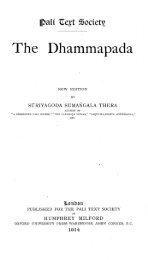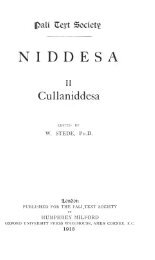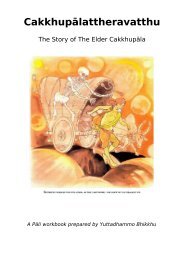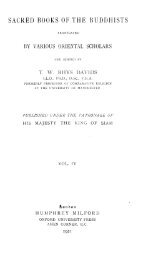Lessons In Practical Buddhism - Sirimangalo.Org
Lessons In Practical Buddhism - Sirimangalo.Org
Lessons In Practical Buddhism - Sirimangalo.Org
You also want an ePaper? Increase the reach of your titles
YUMPU automatically turns print PDFs into web optimized ePapers that Google loves.
actually most apparent in good people; a good person will<br />
feel acutely guilty at even the smallest unwholesomeness,<br />
just as a fastidiously clean person will experience acute<br />
repulsion at the smallest impurity on their body, clothing or<br />
possessions. A person who engages in evil deeds habitually<br />
will not likely feel much guilt for even the most heinous act.<br />
As the Buddha says in the Dhammapada, “pāpopi passati<br />
bhadraṃ, yāva pāpaṃ na paccati” – an evildoer may meet<br />
with fortune for as long as the evil has not ripened.<br />
Nonetheless, with every evil deed they perform, they will<br />
sink deeper into depravity, and be consumed by the fires of<br />
greed, anger and delusion, which the Buddha said burn in<br />
the mind by day and smoulder by night. Every evil deed an<br />
evil doer performs will reaffirm the evil tendencies in their<br />
minds, making it less and less likely that they will be able to<br />
reform themselves and find a way out of their depravity,<br />
while all the while they will suffer the mental anguish that<br />
comes from the defilements. Moreover, an evildoer will<br />
suffer from constant fear of being caught and punished for<br />
their deeds and will suffer great mental torment as a result.<br />
Based on wrong views, ordinary people even feel guilty for<br />
deeds that have no unwholesome quality, like stepping on an<br />
insect without realizing it and thinking that one has<br />
committed murder. Once, in the Buddha’s time, a monk sat<br />
down on a chair that had a blanket on it and crushed a small<br />
child that was under the blanket. He was of course seized<br />
with remorse, but the Buddha made it clear that even this<br />
could not be considered murder – it was rather an act of<br />
negligence, and so he admonished the monks to look<br />
carefully before they sit down from that point onward.<br />
Self-blame is really a horrible curse, one that can cause<br />
people to commit suicide, unable to face the guilt.<br />
Sometimes people hate themselves for their physical<br />
appearance, sometimes for failure in their life or society.<br />
Such situations can be attributed to past karma or even just<br />
to circumstance, and should never be a source of guilt or<br />
self-hatred.<br />
Worry is considered to be an unwholesome mind-state in the<br />
Buddha’s teaching; no good can come from it, and we often<br />
indulge in it as a substitute for real change. If we don’t make<br />
a strong determination to set ourselves in wholesome<br />
15












